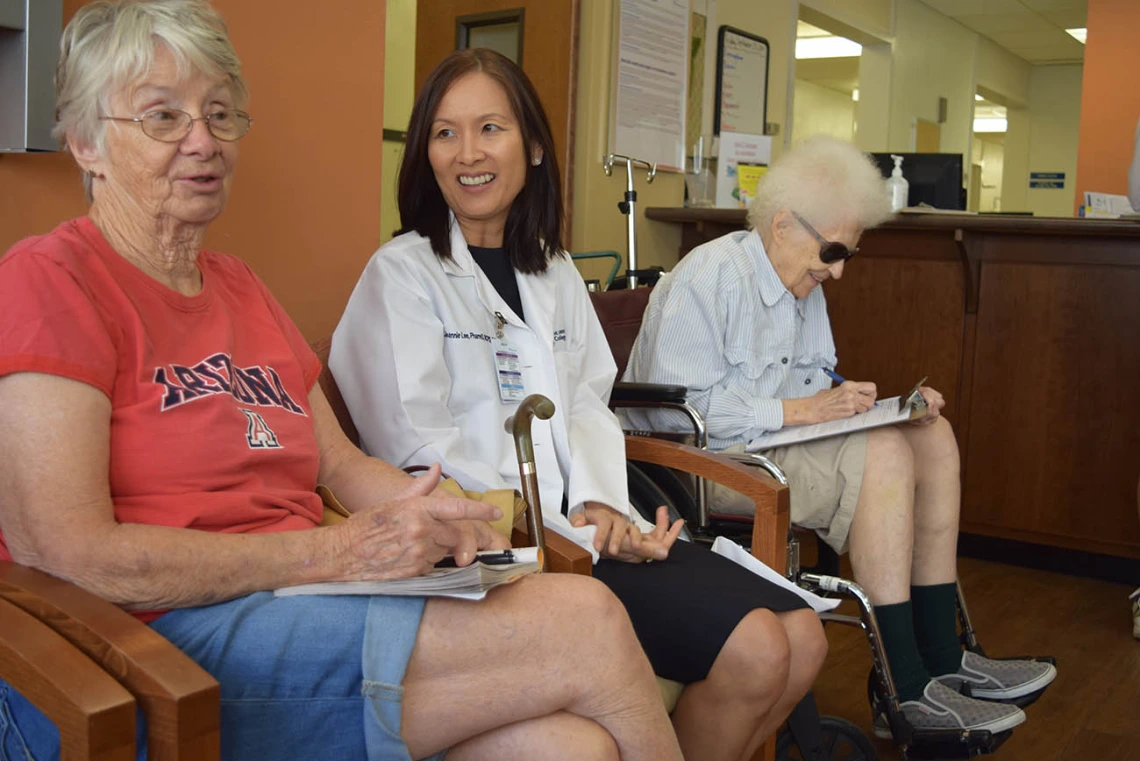Collaboration Among Health Care Workers Shown to Improve Patient Outcomes
Researchers at the UArizona College of Pharmacy took a comprehensive look at interprofessional collaborative practice, which has long been central to optimal primary care though limited evidence existed regarding its association with patient outcomes.

Research led by Dr. Jeannie Lee (center) showed that adults with diabetes or hypertension benefit from physicians, nurses, pharmacists and other health care professionals working together with patients and families. (Photo: University of Arizona Health Sciences/David Mogollon)
The collaboration of health care workers from at least three different professional backgrounds has been linked to better outcomes in adult patients being treated for diabetes and hypertension, according to a recent University of Arizona Health Sciences-led study focusing on interprofessional collaborative practice (ICP).

Jeannie Lee, PharmD, BCPS, BCGP, FASHP, is an associate professor of pharmacy practice and science at the College of Pharmacy. (Photo: College of Pharmacy)
Jeannie Lee, PharmD, BCPS, BCGP, FASHP, associate professor in the UArizona College of Pharmacy Department of Pharmacy Practice and Science and assistant dean of student services, led a team that conducted a comprehensive review of studies that focused on the incorporation of ICP into primary care practice with patients who were being treated for diabetes or hypertension. The goal was to create a clear picture of the impact of ICP on these patient populations.
The findings showed that ICP in primary care is associated with improved clinical outcomes for diabetes and hypertension in adult patients. Evaluating the data from 34 studies published between 2013 and 2018, researchers found that patients who were treated by an ICP showed significant reductions in hemoglobin A1c, a measurement of an individual’s average blood sugar levels over time, as well as systolic and diastolic blood pressure levels.
The paper, “Assessment of Interprofessional Collaborative Practices and Outcomes in Adults With Diabetes and Hypertension in Primary Care,” was published in the journal JAMA Network Open. Dr. Lee’s co-authors are Livia R. M. McCutcheon, PharmD, assistant professor at Wilkes University; and, from the UArizona College of Pharmacy’s Department of Pharmacy Practice and Science, Maryam Fazel, PharmD, assistant professor; Janet Cooley, PharmD, associate professor; and Marion Slack, PhD, senior investigator and professor emeritus.
The authors say the data makes a strong argument for implementing ICP in primary care settings, where it can contribute to high quality and comprehensive patient care by taking advantage of the complementary expertise of various health care professionals.
“As more primary care ICPs are implemented, the research community can broaden our investigations to include additional patient outcomes, other health conditions and ICP in settings outside of primary care,” said Dr. Lee, who often works as part of an ICP in her clinical practice. “Additionally, we hope that payers take note of such findings with cost-savings related to improved health outcomes and provide avenues for reimbursement based on the ICP implementation.”
Contact
Ali Bridges
404-824-6293
abridges@pharmacy.arizona.edu

